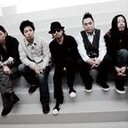
Хотите запечатлеть незабываемые моменты? Доверьте свои фотографии профессионалу! Услуги талантливого фотографа - гарантия качественных снимков и восхитительных портретов.
Тексты песен dragon ash

dragon ash -
episode 2 | текст песни и табы (аккорды) для бас гитары и Mp3
8 дня назад 122,00 (не задано)
8 дня назад 122,00 (не задано)
Информация о артисте
Dragon Ash, вот уже 10 лет играют совершенно разноплановую, но при этом очень качественную и интересную музыку.
В начале свой карьеры ребята играли преимущественно панк-рок и альтернативу, затем начали примешивать к ним хип-хоп (этого требовало время ), потом сместились к хип-хопу и рэгги, не забывая, впрочем, и о роке.
Последние 2 альбома ребята ударились в латино (странное и спорное решение), впрочем, качество музыки осталось на прежнем уровне и слушаются все альбомы очень легко. В Японии они уже давно считаются одними из лучших. Сам мэтр Кинжи Фукасаку не побрезговал поставить их трэк Shizukana Hibino Kaidan Wo как заглавную песню к фильму Королевская битва с Такеши Китано. Read more on Last.fm. User-contributed text is available under the Creative Commons By-SA License; additional terms may apply.
В начале свой карьеры ребята играли преимущественно панк-рок и альтернативу, затем начали примешивать к ним хип-хоп (этого требовало время ), потом сместились к хип-хопу и рэгги, не забывая, впрочем, и о роке.
Последние 2 альбома ребята ударились в латино (странное и спорное решение), впрочем, качество музыки осталось на прежнем уровне и слушаются все альбомы очень легко. В Японии они уже давно считаются одними из лучших. Сам мэтр Кинжи Фукасаку не побрезговал поставить их трэк Shizukana Hibino Kaidan Wo как заглавную песню к фильму Королевская битва с Такеши Китано. Read more on Last.fm. User-contributed text is available under the Creative Commons By-SA License; additional terms may apply.
Dragon Ash started out from humble punk beginnings to become one of the brightest groups in the growing New Japanese Rock movement in the late '90s, blending pop sensibilities with a hard-edged sound, producing albums and singles that play like a tour of Western rock of the '90s. Lead singer and guitarist Kenji Furuya, son of actor Ikko Furuya, met drummer Makoto Sakurai when they were junior high students in a Tokyo suburb, and the two started playing together. Though temporarily sidetracked into following in his father's footsteps, Furuya gave up the few acting gigs that he was getting on TV dramas to concentrate on music in high school. In 1996, knowing what they wanted but needing some sort of mentor, they took on bass player Ikuzo Baba, ten years their senior. Furuya and Sakurai had the talent and drive — Baba brought experience and a wealth of musical knowledge. Dragon Ash was born. The group debuted in 1997 with two EPs at the beginning of the year, The Day Dragged On and Public Garden, which showed their raw, punk hardcore style, influenced by another rock trio, Nirvana. By the end of the year and time of their release, Mustang!, the group had progressed from their simple punk roots to a blend of pop, funk, hardcore, rap, and metal. Through 1998 their popularity increased, and by the time of Buzz Songs, their sound had solidified to rock/rap, helped with the mixing skills of DJ Bots, who occasionally appeared on some songs. Two singles — "Let Yourself Go, Let Myself Go" and "Grateful Days," the latter featuring hardcore rapper Zeebra and soulstress ACO — sold so well that they cracked the Japanese Oricon charts, usually reserved for pop music, and went to number one. Now Dragon Ash had become a four-piece, with DJ Bots essential to the mix. Their third album, 1999's Viva la Revolution, not only signified the arrival of the band as a major group in Japan, but was one of the first volleys in the New Japanese Rock movement. In 2000, Dragon Ash undertook the Total Music Communication Tour, touring Japan with a lineup that included other rising rock acts, such as Missile Girl Scout, Penpals, and Skebou Kings. Meanwhile, Furuya and DJ Bots formed a duo of sorts, writing and producing songs for acts such as Sugar Soul under the name Steady & Co. Likewise, Baba and Sakurai sidelined as a remixing unit called Motor Headphone, popping up on various compilations. If anyone had any doubts that the group was softening around the edges, 2001's Lily of da Valley was as hard, funky, and uncompromising as their earliest work. Read more on Last.fm. User-contributed text is available under the Creative Commons By-SA License; additional terms may apply.
